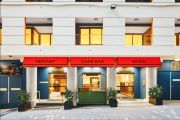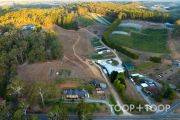
Sentinel takes Brisbane office property deals to Japan
Australian property investors such as Sentinel Property Group chief executive Warren Ebert are heading to Japan to seek out capital for the first time – just as large Japanese property investors widen their scope of investment in real assets.
Ebert, who met institutional investors in meetings two weeks ago in Osaka and Tokyo about funding the purchase of two undisclosed office properties in Brisbane, said it was his company’s first direct attempt to raise money from overseas investors.

“The only overseas equity we have raised previously is from expats,” he told The Australian Financial Review. “We would usually close out within a week. Given our acquisition appetite for this year, we believe now is the time to look at Japan.”
It’s a step-up for Sentinel that marks a bigger size of property acquisition – “It’s got to be $100 million-ish – it’s not going to be $10 million, $20 million,” Ebert said – and it is a process that needs much more than the week it takes to close when dealing with the high net worth investors providing most of his funds.
“We’ve got a group coming out next month,” he said. “It takes a while. I’ve been twice in the last six months. We’ll be up there every six weeks now. You’ve got to keep going back to talk to them.”
Brisbane-based Sentinel is part of a growing wave of Australian property companies scouring Japan for capital partners, Ian Williams, the author of Herbert Smith Freehills’ Japan-Australia Investment Report 2024, told the Financial Review last week.
Japanese investor enthusiasm is also clear from the fact that they invested $US1.9 billion in the sector in each of CY2024 and CY2023 – a level of investment second only to the US, bringing the two-year total to more than the previous 22 years combined.
But Australia’s transaction volumes are just one-tenth the size of those by Japanese investors in the US, reflecting Japan’s growing – and diversifying – interest in Australian real estate, said MSCI Pacific head of private assets research Ben Martin-Henry.
“The bulk of this recent activity has been focused on the office sector,” he said, noting Mitsui Fudosan’s acquisition of a two-thirds stake in Mirvac’s 55 Pitt Street project in Sydney.
“However, Japanese investors have also increasingly shown interest in commercial residential and industrial assets, highlighting a diversification of their investment strategies within the Australian market.”
The growth in the bilateral trading relationship – in which the latest HSF report shows the 72 transactions last year were dominated for value by energy – shows links between the two countries are stronger now than they ever were in the last Japanese investment boom in the 1980s, said Tokyo-based Australian businesswoman Melanie Brock.
“The nature of the relationship has got stronger,” said Brock, who is a non-executive director of Mitsubishi Estate, Kawasaki Heavy Industries and Asahi Group Holdings. “In many ways, it’s because of the maturing nature of the Japanese investment profile. They understand more about how an investment in Australia fits in with their global requirements and needs.”
The expansion also coincides with a push under way since 2023 by Japan’s government and the Tokyo Stock Exchange to ensure listed companies become more efficient with their capital allocation and increase shareholder returns.

“Australia has great fundamentals for Japanese investors,” said David Shirt, chief executive of Tokyo-based financial advisory firm Astris Advisory and a former Macquarie banker.
“We have seen a marked increase this last year in Australian infrastructure, real assets firms looking to source capital from the world’s third-largest pension pot, which is being forced to seek out better returns in a rising rate environment.”
Sentinel last year acquired the 15-storey RACQ House office tower at 60 Edward Street in Brisbane, which at $72 million was less than half of its estimated replacement cost of $150 million. Ebert said his bet to buy underpriced assets counted on global interest in the Queensland capital growing in the run-up to the 2032 summer Olympic Games.
While many people knew Sydney and Melbourne, far fewer knew Brisbane, he said, citing brand awareness research the 2032 organising committee did in 2022. It was based on a small sample, but found just three of 90 people quizzed across five international markets knew of the city.
“We get closer to 2032 and everyone will know where Brisbane is,” Ebert said. “Brisbane is a bloody nice place. We think there are great opportunities in the office sector. While others are selling want to be buying, and we are buying. We’re after some bigger chunks of capital.”
Ebert, who said conversations with potential Japanese investors revolved around individual specific assets rather than portfolio-level investments, said he expected to secure capital for his planned acquisitions this year.
“They will be in Brisbane by the end of this year.”











